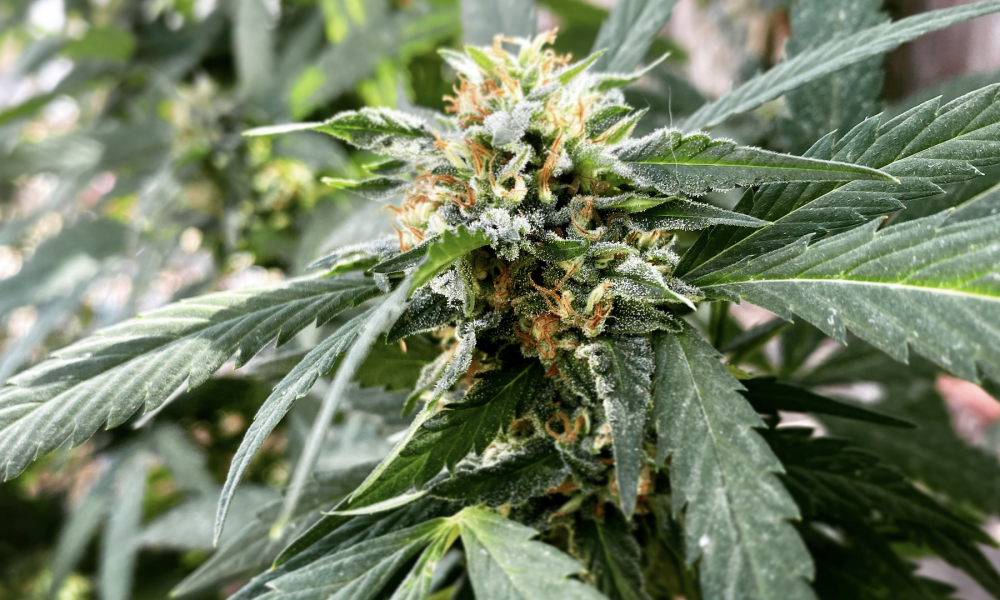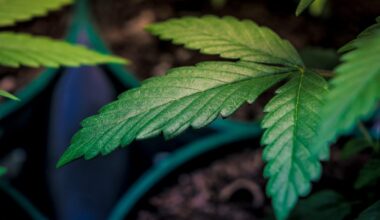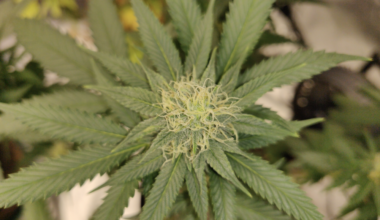The governor of South Dakota says that it’s her job to oversee the implementation of marijuana legalization if voters approve it at the ballot this November. But it’s a job that critics say she deliberately shirked after voters passed a legalization measure just two years ago.
Gov. Kristi Noem (R) made the latest comments at an event last week, attempting to explain why she was taking a different approach to citizen-led reform this round by saying that the 2022 initiative “is written more appropriately towards the Constitution.”
Advocates aren’t quite buying it, though. The lawsuit that led the state Supreme Court to invalidate a 2020 legalization measure that voters approved at the ballot originated in her office. Now that she’s up for reelection, some suspect that the pivot is an attempt to align herself with a popular issue and divert attention from her former obstruction.
To avoid another legal challenge, South Dakotans for Better Marijuana Laws (SDBML) did take a more narrowly tailored approach to legalization with the new 2022 initiative, omitting provisions that deal with taxes and regulations like the earlier version and leaving those decisions up to the legislature.
But the idea that Noem—who vetoed a hemp reform bill in 2019 and actively urged voters to oppose the adult-use measure in TV ads the following year—is now content to implement legalization if voters approve it has raised some eyebrows.
Reminder: Kristi Noem used taxpayer dollars to overturn voter-approved recreational marijuana, and defied the will of the people.
It’s high time for our elected officials to respect South Dakotans’ decisions.
— SD Democratic Party (@SoDakDems) August 23, 2022
The governor has taken steps to align herself with the enactment of medical cannabis reform that she previously opposed, including by airing taxpayer-funded ads highlighting her role in the implementation. But advocates and pro-reform lawmakers in the state have consistently questioned her motives.
“This is phase two of Gov. Noem’s PR rebranding on cannabis,” Matthew Schweich, campaign director of SDBML, told Marijuana Moment. “Last year she spent a significant amount of taxpayer money running ads to present herself as the responsible steward of medical cannabis even though, just months before, she advocated for legislation to severely delay implementation of the medical law.”
“Thankfully, we defeated her,” he said. “Since then, she’s been very quiet on cannabis and now finally she has expressed her desire to respect the will of the people when it comes to cannabis policy in South Dakota.”
Noem was also asked during last week’s event about what would happen to people who have faced marijuana convictions if voters pass the legalization initiative. She said that it’s “hard to have that discussion when you don’t know necessarily if it’ll pass or not,” the Argus Leader reported.
House Minority Leader Jamie Smith (D), who is the Democratic nominee challenging the governor this year, has also taken Noem to task over her prior efforts to interfere in voter-approved legalization, releasing ads this month that remind voters of the interference.
“Kristi Noem sued the voters the first time we approved recreational marijuana,” Smith said on Tuesday in response to reports about the governor’s latest remarks. “It’s suspicious that this sudden change of heart conveniently happens during an election year.”
Kristi Noem sued the voters the first time we approved recreational marijuana.
It’s suspicious that this sudden change of heart conveniently happens during an election year. https://t.co/rT7ZTp8K22
— Jamie Smith for SD Governor (@RepJamieSmith) August 23, 2022
A poll released in December 2021 found that most South Dakota voters approved of Noem’s job performance overall, but just 39 percent supported her handling of marijuana legalization, with 51 percent disapproving.
Noem tried to get the legislature to approve a bill to delay implementation of the medical cannabis program for an additional year, but while it cleared the House, negotiators were unable to reach an agreement with the Senate in conference, delivering a defeat to the governor.
In response, her office started exploring a compromise last year, with one proposal that came out of her administration to decriminalize possession of up to one ounce of cannabis, limit the number of plants that patients could cultivate to three and prohibit people under 21 from qualifying for medical marijuana.
—
Marijuana Moment is tracking more than 1,500 cannabis, psychedelics and drug policy bills in state legislatures and Congress this year. Patreon supporters pledging at least $25/month get access to our interactive maps, charts and hearing calendar so they don’t miss any developments.![]()
Learn more about our marijuana bill tracker and become a supporter on Patreon to get access.
—
Following the court ruling that invalidated the earlier ballot box win, activists decided to take a two-track approach to the policy change in 2022, both working with legislators for a legislative reform while separately collecting signatures for the ballot initiative if lawmakers failed to act.
While they would have preferred lawmakers to enact the policy change, that did not materialize this session. The House rejected a Senate-passed legalization bill in March, effectively leaving it up to activists to get on the ballot again.
SDBML then successfully turned in enough signatures to qualify again for 2022. The organization said it intends to work with lawmakers on that measure while continuing to push for the ballot measure.
Here’s what the campaign’s marijuana legalization ballot initiative would accomplish if approved by voters:
The measure would allow adults 21 and older to purchase and possess up to an ounce of cannabis. They could also grow up to three plants for personal use.
It also lays out civil penalties for violating provisions related to issues such as public consumption or growing more plants than permitted.
Employers would specifically be allowed to continue enforcing workplace drug policy prohibiting cannabis use by workers.
State and local governments could continue to ban marijuana activities made legal under the initiative in buildings “owned, leased, or occupied” by a governmental body.
The measure does not touch on regulatory policies concerning taxing cannabis sales, licensing or equity.
A Marijuana Interim Study Committee, headed by legislative leaders, was established last year to explore cannabis policy reform, and the panel ultimately recommended that the legislature take up legalization this session. The House-defeated legislation was one of the direct products of that recommendation.
With respect to the 2022 ballot, South Dakota is just one of several states where voters may decide on drug policy reform this November.
In neighboring North Dakota, voters will have the chance to decide on marijuana legalization at the ballot this November, the secretary of state’s office confirmed.
Oklahoma officials certified on Monday that activists have collected enough valid signatures to place a marijuana legalization initiative before voters. But the measure may not end up on this November’s ballot as planned, because there are still additional formalities the proposal needs to go through as state deadlines to print voting materials approach.
Nebraska lawmakers and advocates are considering new paths forward for marijuana reform—including pursuing recreational legalization on the 2024 ballot or convening a special legislative session to pass medical cannabis in the interim—after state officials announced that a medically focused reform campaign had come up short on signatures to put their measures before voters this year.
The Arkansas Supreme Court recently ordered the secretary of state’s office to certify a marijuana legalization initiative for the November ballot—but there’s a chance that the votes will not end up being counted, depending on the final outcome of a pending legal challenge.
Maryland elections officials have finalized the language for a marijuana legalization referendum that lawmakers placed on the November ballot, and have issued a formal summary of the reform proposal.
Missouri’s secretary of state announced earlier this month that activists had turned in enough signatures to put marijuana legalization on the state’s November ballot.
Colorado voters will have the chance to decide on a historic ballot initiative this November to legalize psychedelics and create licensed psilocybin “healing centers” where people can use the substance for therapeutic purposes.
Michigan activists announced in June that they will no longer be pursuing a statewide psychedelics legalization ballot initiative for this year’s election and will instead focus on qualifying the measure to go before voters in 2024.
The campaign behind an effort to decriminalize drugs and expand treatment and recovery services in Washington State said in June that it has halted its push to qualify an initiative for November’s ballot.
While Wyoming activists said earlier this year that they made solid progress in collecting signatures for a pair of ballot initiatives to decriminalize marijuana possession and legalize medical cannabis, they didn’t get enough to make the 2022 ballot deadline and will be aiming for 2024 while simultaneously pushing the legislature to advance reform even sooner.
In March, California activists announced that they came up short on collecting enough signatures to qualify a measure to legalize psilocybin mushrooms for the state’s November ballot, though they aren’t giving up on a future election cycle bid.
An effort to put adult-use legalization on the statewide ballot in Ohio fizzled out this year, but the campaign did secure a procedural legal win that will allow them to hit the ground running for a planned 2023 reform initiative.
Locally, Ohio voters in at least seven cities will get a chance to join many of their neighboring jurisdictions in enacting local marijuana decriminalization at the ballot this November.
Voters in five Texas cities will also vote on local cannabis decriminalization measures this year.
Advocates have also worked to place local decriminalization ordinances on the ballot in West Virginia.
Wisconsin voters in at least half a dozen cities and counties will also be asked on November’s ballot whether they support legalizing, taxing and regulating cannabis in a manner similar to alcohol. Those Wisconsin advisory questions will be non-binding, however, and are intended to take the temperature of voters and send a message to lawmakers about where their constituents stand.
Medical Disclaimer:
The information provided in these blog posts is intended for general informational and educational purposes only. It is not a substitute for professional medical advice, diagnosis, or treatment. Always seek the advice of your physician or other qualified healthcare provider with any questions you may have regarding a medical condition. The use of any information provided in these blog posts is solely at your own risk. The authors and the website do not recommend or endorse any specific products, treatments, or procedures mentioned. Reliance on any information in these blog posts is solely at your own discretion.







